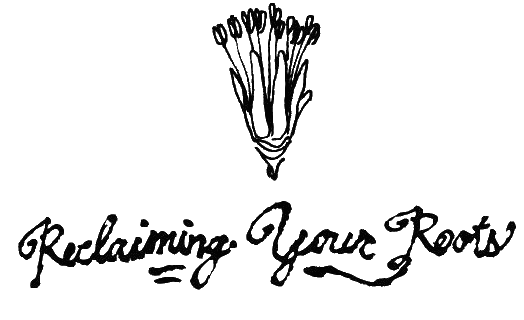Beating the Winter Time Blues: Holy Basil
I have struggled with anxiety off and on throughout my life, especially since my bout with chronic health issues and the trauma this caused. Our mental wellness is not often discussed even amongst family and friends and mental health issues carry with them significant stigma. The truth is that we live in a world and culture today in which anxiety and depression are commonplace. Everyday our nervous systems are bombarded by a variety of stressors (physical, environmental, emotional, spiritual, etc. ). I do not have enough space in this tiny newsletter to delve deeper into the root causes of mental health issues at this time. That being said, I feel that we have much healing work to do as a community in this area and think that our plant allies have much to offer us here.
During the fall and winter time, with less sunlight, colder days, and more time indoors, many of us experience an increase in mental health issues or what’s commonly referred to as “the blues” (i.e. increased anxiety, depression, fatigue, etc.) I have many herbal loves when it comes to supporting the nervous system and overall mental health during the colder months. However, one of my favorite mood elevating or "spirit lifting" herbs at the moment is Holy or Tulsi Basil, and one of my favorite ways to prepare it is as a spicy chai. It will help to warm your heart and your bones.
Holy or Tulsi Basil Ocimum sanctum
Parts used: Aerial parts
History and Modern Medicinal Uses: Holy basil is a sacred plant in India and considered one of India’s most powerful healing herbs, believed to maintain the balance of charkas and heal a variety of ailments. In Ayurveda, it is considered “sattvic” or harmonious in nature. Although this plant is native to India, as well as China and Thailand, it grows quite well here in North America and will thrive in the garden. Holy Basil is an adaptogen herb meaning that it increases the body’s ability to adapt to environmental and internal stress through strengthening the immune, nervous, and endocrine systems and reducing the negative effects of chronic stress. There have been a number of clinical studies on both animals and humans showing the benefits of this plant. Holy basil has neuroprotective and cerebral stimulating properties and can be used to enhance cerebral circulation and memory. It’s been used successfully in the treatment of ADD and ADHD. Studies have shown it to substantially lower blood sugar levels through normalizing cortisol levels, making it beneficial for diabetes. Holy basil is an immunomodulator, meaning that it normalizes the immune system. It also modulates inflammation, making it beneficial for treating hay fever and allergic asthma. Animal studies have shown it to protect against radiation damage to the liver and chromosomes of cells. Holy basil is said to be “mood elevating” and can be used to treat anxiety and depression, specifically when trauma-induced (PTSD). Holy basil has antioxidant and antimicrobial properties and also supports the digestive system through its carminative (gas-alleviating) properties. If that’s not enough, it also supports cardiovascular health and acts as an expectorant, removing excess mucus from the lungs and upper respiratory tract.
Dosage: Tincture: 40-60 drops, 3x/day; Tea: 1 tsp dried leaf to 8 oz water, infused 5-10 min. Take 4 oz, up to 3x/day. For use as an adaptogen, it's best to take daily for 1-2 months.
Contraindications: May have antifertility effects. Some contradictory animal studies have suggested it may be toxic to embryos. To be safe, it’s best to avoid holy basil during pregnancy or if trying to conceive.
Holy Basil Chai
(for 1 qt of tea)
2 c filtered water
2 c almond or coconut milk
2 T holy basil
2 tsp ginger root
2 tsp cinnamon chips
1/8 tsp cardamon seeds
1-2 cloves
*Optional honey to taste
1)In a small sauce pan, combine water and almond or coconut milk. Gently warm until it's just about to boil. Pour over loose herb mixture in mason jar or add herbs to the sauce pan. Cover and let steep 15 min.
2) Strain herbs and add honey or maple syrup to desired sweetness. Enjoy a warm cup of this chai when your spirits need lifting!


